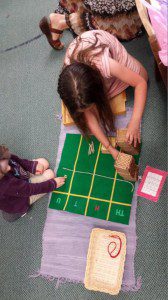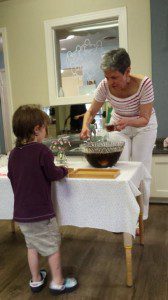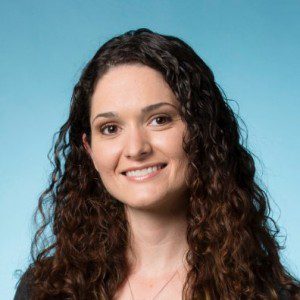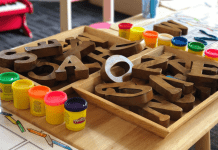 My husband and I wanted to find a school that ignited a passion for learning because we believe this lays the foundation for success. We were in search of a school that not only taught the hard academic skills, but also the softer skills of goal setting, leadership, dress, etiquette, etc. After interviewing several schools at the TCU Private School Preview and a lot of online research, we decided to book our first tour for The Montessori School of Fort Worth (formally Montessori’s Children’s House). We were in love immediately.
My husband and I wanted to find a school that ignited a passion for learning because we believe this lays the foundation for success. We were in search of a school that not only taught the hard academic skills, but also the softer skills of goal setting, leadership, dress, etiquette, etc. After interviewing several schools at the TCU Private School Preview and a lot of online research, we decided to book our first tour for The Montessori School of Fort Worth (formally Montessori’s Children’s House). We were in love immediately.
The teachers here foster independence and confidence in their students by preparing the classroom in such a way that the child is able to interact with the materials with minimal intervention from the adults. The teachers and the children all focus on the process of learning and on getting it right instead of just getting it done. Each child moves at his or her own pace, working until he or she masters the material.
 The Montessori approach is different. An example is the classic golden beads. First, children learn about the decimal system of ones, tens, hundreds, and thousands by handling actual glass beads that give visual and tactile feedback. The thousand cube is actually 1,000 times heavier than the units, and the child can see that a ten bar is made up of ten beads, 100 square is ten tens bars and so on. These materials show abstract concepts in a concrete way. When this concept is mastered, the children then learn how to use these beads to perform all four mathematical operations. Our five year old is adding four digit numbers! And we have quizzed her; she really does have a firm grasp of the concepts.
The Montessori approach is different. An example is the classic golden beads. First, children learn about the decimal system of ones, tens, hundreds, and thousands by handling actual glass beads that give visual and tactile feedback. The thousand cube is actually 1,000 times heavier than the units, and the child can see that a ten bar is made up of ten beads, 100 square is ten tens bars and so on. These materials show abstract concepts in a concrete way. When this concept is mastered, the children then learn how to use these beads to perform all four mathematical operations. Our five year old is adding four digit numbers! And we have quizzed her; she really does have a firm grasp of the concepts.
In addition to the golden beads, there are many materials that support a child’s learning, all moving from the most concrete to more abstract. Each Montessori material adds to the bank of knowledge so the child learns with a layering of information. The curriculum is a flow between many disciplines. At the elementary level, children are introduced to the universe, the planets, earth, the history of humans, the history of language, and math. Within all these broad topics, the students collectively study geography, science, history, zoology, and botany. It is a spiraling curriculum so that each year the students briefly revisit what they learned the year before then add to that knowledge bank, doing more research and collaborating with classmates.
I recently took a tour of their new middle school. I learned that last spring the middle school students studied the various concepts of force. I loved how they purposefully integrated the concept of force into all topics. They studied the forces of nature, the force of the persuasive writing, and the forces behind the Texas Revolution. At the end of these lessons on force, they took a field trip to the gorge at Canyon Lake to see how the force of water cut a slice of land away so that you can actually see the layers of earth and the fossil record. They visited Gonzales, Texas, where the Texas Revolution started; the Alamo; and the Bob Bullock Museum for a Texas history lesson.

Another unique aspect of the school is that there are multiple ages in a single class. This provides an opportunity for younger children to learn from their peers and provides the older children a chance to be the leaders in their class. I remember walking into the elementary classroom and watching an older student give a lesson to the younger students. The younger students sat around her and were so enthralled by the lesson. They obviously saw her as a role model, and she took her leadership role very seriously.
A mixed aged classroom offers another advantage as well. The continuity of teachers for 3-4 years creates a special relationship between the students and teachers. My children’s teachers really know and understand them. Because of this focus on each child as an individual, I never worry if my children are keeping up, getting ahead, or getting bored.
Even though students get to set their own schedule and are in control of their weekly schedule, the classrooms are quiet, busy places where big work is being done. In fact, children in elementary and junior high are in charge of writing out their educational goals and scheduling all the activities they need to achieve their goals. This act alone will serve these children well in workplace and in their personal life.
I wish I could take all the credit for how well behaved my children are. But in reality, it’s likely the school’s weekly etiquette classes. The etiquette lessons are reinforced as the preschool classes (three years old to kindergarten) take turns hosting a party. One class decides the theme, creates the invitations, and serves the other class. The invited class then writes thank you notes for the party. Furthermore, at each event we have been to the school, the older students serve as greeters. I have always been impressed by how well poised and confident they were.
Just FYI: Before we knew anything about Montessori, I had heard conflicting reports. I learned at the TCU Private School Preview that the word Montessori is not trademarked, so anyone can use it. That said, there is an accreditation body. Montessori School of Fort Worth is accredited by the American Montessori Society (AMS), the largest Montessori organization in the world. The AMS accreditation certifies that the school offers a true Montessori curriculum. MSFW is also accredited by AdvancED, the largest community of education professionals in the world. AdvancEd ensures that the school has appropriate education goals and programs.
The Montessori School of Fort Worth now goes through to 8th grade. We plan on staying and hope that one day they will go all the way through to 12th grade. Secretly, I wish I could go back to preschool. It really is that cool.
What questions about Montessori education do you want to ask Rita?
 Rita is the proud momma of five. She has a five year old girl, a four year old boy, and identical triplets who reside now in Heaven. She and her husband live each day to honor the short but sweet lives of their Sadie, Emiliana, and Alexandria. They use that chapter of their lives to power their commitment to be fully present for their living kiddos, to remain committed to each other, and to keep their faith in God.
Rita is the proud momma of five. She has a five year old girl, a four year old boy, and identical triplets who reside now in Heaven. She and her husband live each day to honor the short but sweet lives of their Sadie, Emiliana, and Alexandria. They use that chapter of their lives to power their commitment to be fully present for their living kiddos, to remain committed to each other, and to keep their faith in God.
She also serves on the board for the Back to School Roundup, a volunteer-driven, nonprofit organization dedicated to providing underserved schoolchildren and their families with school supplies and other “back to school essentials” necessary to return to school ready, and equipped, for a successful academic year. In addition, she is a freelancer who does all things nerdy for nonprofits (evaluation, grants, surveys, project management, and much more).














I’m very interested in this particular school. I have a 3yo daughter. I think I’d like to start her here next year, when she is 4. What is the process for that? When are you supposed to call and set up tours? Is there a wait list? Thanks!
Krista,
The Montessori School of Fort Worth (formerly Montessori Children’s House) on Clayton Rd. is an amazing, nurturing place for ages 18 months through middle school. I suggest you check out the website and contact the school asap for more details. http://www.mchfw.com Good luck to your daughter. Hope she gets to experience this very special education.
Thank you Rita for ‘representing’! I really enjoyed reading this piece- you hit on all the positives of the school. These kindergartners are being exposed to so many wonderful subjects (math, geology, geography, human anatomy, etc). I often wish I had attended Montessori school as a kid. I would have loved going to school.